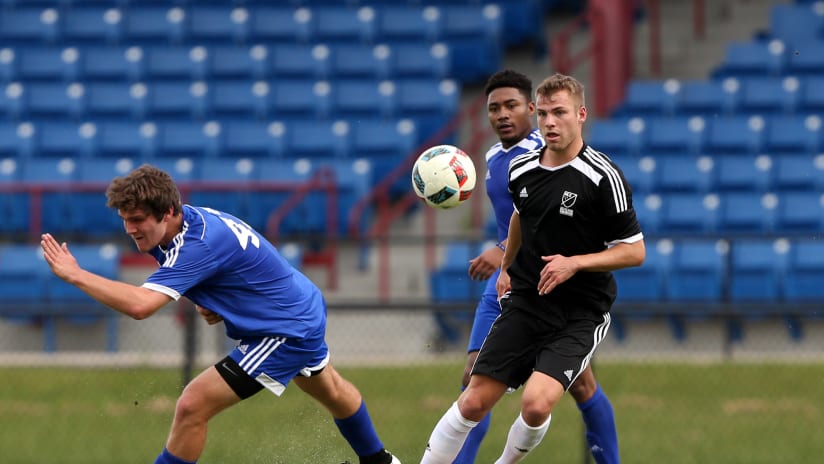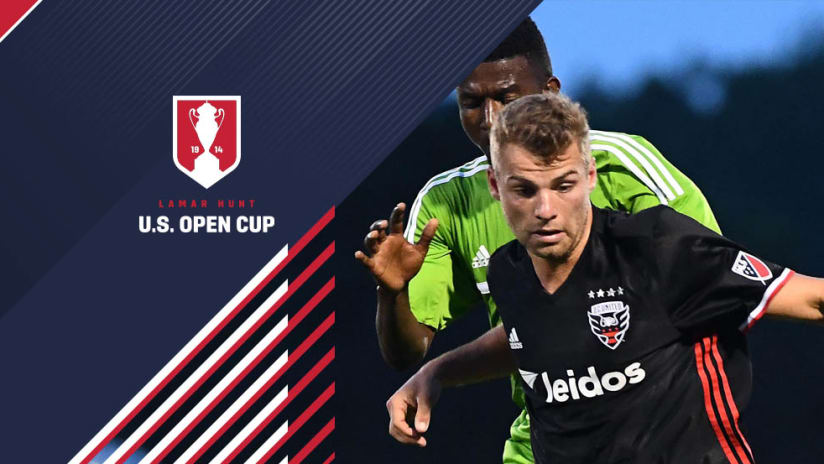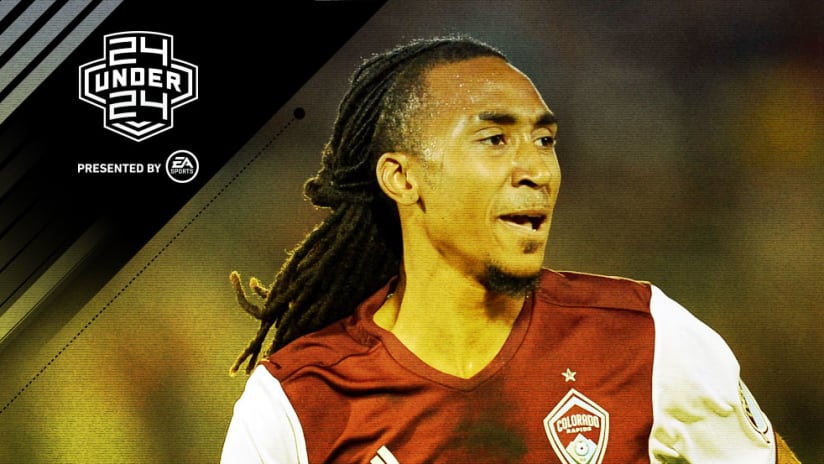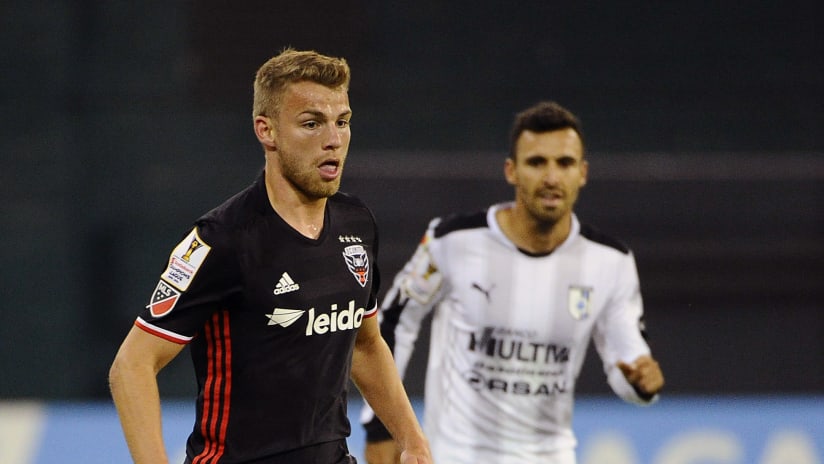As we near Thursday’s MLS SuperDraft, it’s time for a look at the last member of this year’s Generation adidas class, Syracuse midfielder Julian Buescher. The 22-year-old sophomore just ended his college career with eight goals and 11 assists over the 2015 season, being voted second team NSCAA All-American along the way.
1. He’s yet another top prospect this year who hails from Germany
“I grew up in Duelmen, which is close to Cologne – between Cologne and Amsterdam, actually like one hour away from the Netherlands. Everybody is riding a bike over there. That’s one thing we took from the Netherlands.
Amsterdam is very multicultural and it’s a fun place to be. We would go for vacation growing up.”
2. By age 18, he was already playing in Germany’s third division
“There are clubs everywhere – I think we have like 12 divisions in Germany – so even my small hometown of just 2,000 people had a club. Because we don’t have basketball or anything over there – we’re just not strong enough, I guess, or tall enough – we just grow up playing soccer all day.
So after I played with my local club team academy, I went to Preussen Munster, in the third division, about 30 minutes away. The third division is pretty decent in Germany. I actually went to another club that was bigger, but I wasn’t good enough for the first team, so then I went back to Preussen Munster.”
3. But that doesn’t mean he was getting actual game time – so a teammate suggested college in the US.
“I played a couple times with Preussen Munster, but not too much. We had some guys there from big teams already – like one guy played for Barcelona and then came over. So I learned there, but I didn’t see the field that often.
There was one striker on the team who played for UCLA when he was younger, and he said, ‘If you actually want to enjoy life and grow as a person, you should go to America and figure out things for yourself.’
He was talking super nice about college and how awesome it is, so I said, ‘Why not? I’m sitting on the bench and the coach told me I have to grow up anyways, so why not use the time somewhere different and learn a different language?’
4. He knew pretty much one word in English, and not one soul, when he arrived.
“I came totally by myself. I didn’t speak English at all. When I stepped off the plane and my coach asked me my name, I just said ‘yes,’ because I had no idea what he said.
Later, a couple guys on the team used to love swear words and I just picked them up as regular words, and in the beginning used them way too often. They used “f*” way too often, so I would use it all the time, just thinking it was a regular descriptive word.
And at one point, my coach told me I shouldn’t use it that often any more, especially when he had his kids over. It was pretty embarrassing, I guess – but everything worked out.”
5. The NCAA style of play also took some adjusting.
“Sometimes my neck was hurting from watching all those long balls. But otherwise, it was a little bit faster because you have the rule you can sub in and out in college. So those guys are running around the whole time; they never stop.
That’s different for sure. In Germany they try to hold the ball a little bit more, and I would say it’s a little bit more technical. So it took me a little bit in the beginning of the season just to understand how the guys played.”
6. The difference in approach to the game made him want to work harder.
“If you don’t know about college, you think it’s like a school team, it can’t be that good. I thought a college team would be good, hopefully, but how good, you don’t know.
And then I realized how hard those guys are working and how the facilities they have here in America are just crazy to me, because in Germany we don’t have college teams. So that was something that really got me grinding, because I saw how hard everyone was working.
When I got here, I did some pull-ups and I could maybe do three or something, and everybody else was doing them easily. So I thought, ‘Okay, that’s something I have to work on.’ I don’t know exactly how many I can do now – but it’s more than three for sure."
7. Still, the culture shock was real.
“Food, probably was the biggest thing. It is not that great all the time. And college life, I didn’t know about Greek life or anything like that. It was interesting and very American.
They say Syracuse was the No. 1 party school my first year, and the second my second year. It was … interesting. Those people all want to have fun. With so many people around the same age all together, it’s a good time.”
8. But soon, he adjusted – and found real community with his Syracuse teammates.
“I like how open the people are here. Sometimes they’re a little too open, but in Germany it takes a while to break the ice. You meet people here and they’re like, ‘Sleep at my place, no problem,’ or, ‘Hey, come have dinner.’
It’s nice to have people just come in the room and say, ‘Hey, how are you.’ Even if they don’t want to know how I am, they break the ice. So that helps already and I like that about the culture here.
I always liked to kick around in Germany just for fun at night, and I never found guys to join me. When I got here, I asked some guys, ‘Wanna play later?’ And they were like, ‘Yeah, no problem.’ So I was like, ‘Okay, they’re interested like I am, and they feel the same way I do.’ That was cool.”
9. He also decided to take advantage of Syracuse’s esteemed business school.
“They put me in sports management when I came here, but I thought, ‘If I come all the way from Germany to America, I want to do something right,’ and I knew Syracuse’s business school was pretty good, so I applied there.
“Before I took the Generation adidas contract, I was studying supply-chain management. I like logistics and I know the Netherlands is pretty good in it, so that was the closest thing in our business school. I got a pretty good GPA this last semester.”
10. The possibilities of MLS got real for him last year.
“I saw two guys leave from my college team to Toronto FC – Alex Bono and Skylar Thomas. So I was like, ‘Okay, if they can do it, you can probably do it as well.’
My first MLS game was Toronto, at BMO Field, against the San Jose Earthquakes, I think. You see all those stadiums and how crazy the people are about soccer and you think, ‘Okay, that’s cool.’”













